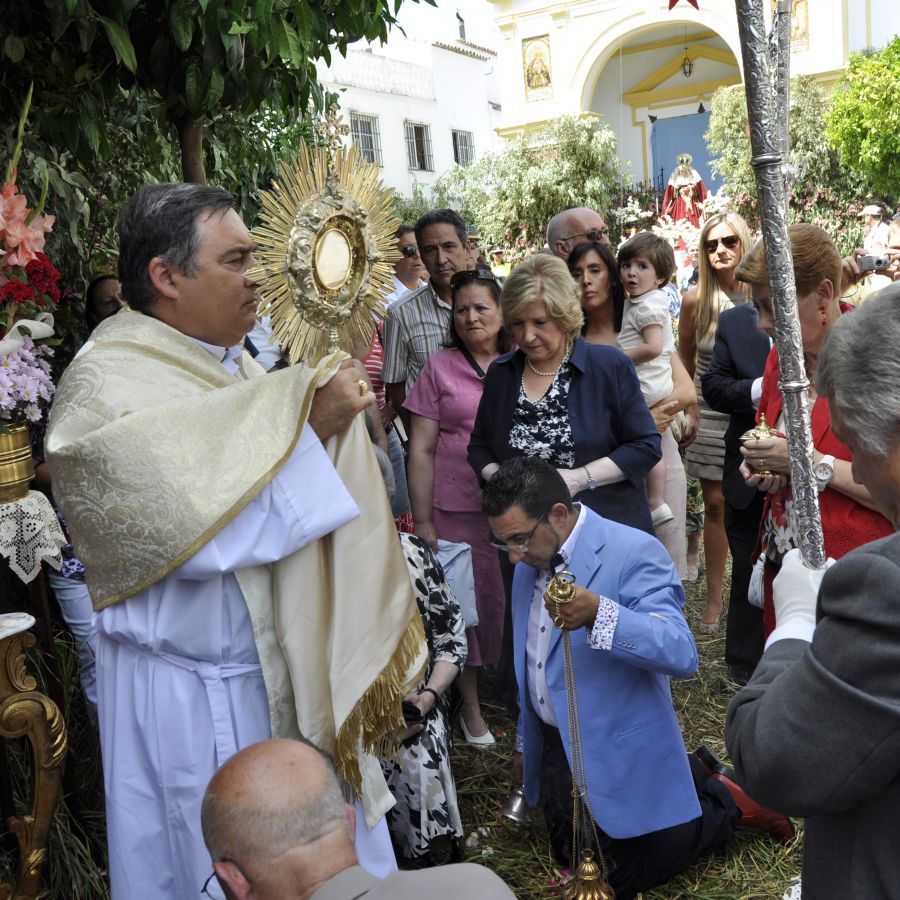Documents.

Letter addressed to
the Conference of bishops, opposing the transfer of the Corpus festival to the sunday
Your Most Reverend Eminence, The Residents’ Association “Juncia” of the town of Zahara de la Sierra (Cadiz) comes before Your Reverence and, as prescribed by law, respectfully states:
- - It is a deep-seated and pious tradition in this most noble town to venerate and honour the Eucharist on the day of Corpus Christi, which was held, in accordance with the dispositions of the Transiturus Bull of Pope Urban IV in the year 1264, on the Thursday following the Octave of Whitsun.>
- - The literary descriptions of our Corpus are many and varied. As an indication of its exactitude and sobriety, we transcribe the following:
“When, after climbing the steep, narrow streets the traveller reaches the highest point of the town perched on the hilltop, he quivers at the sight of the extraordinary view that his wonderstruck eyes behold. The people of Zahara, with praiseworthy commitment and after great endeavour, have recreated a wondrous forest replete with greenery, fragrance, light and colour.>
The surface of the streets is thickly carpeted with fresh, green grass. The walls are extravagantly covered with poplar branches interwoven with flowers, oleander and aromatic plants. The gleaming balconies are covered with valuable shawls and embroidered quilts and, strategically scattered, small altars, skilfully decorated, wait for the procession, following the pattern of an age-old ritual dating back to the dawn of Christianity in the town, to come to a halt before them on its annual journey through the squares and main streets of the crowded, bedecked town.
On conclusion of the concelebrated High Mass, the Blessed Sacrament, protected in a centennial monstrance, leaves the parish church of Santa Maria de la Mesa, in other times an archpriestal seat, beneath a magnificent red and golden pallium whose six poles are borne, with dignity and care, by worthy men of the town. Leading the cortège is a tinkling silver baroque banner, watched by the First Communion children, diverse authorities and a multitude of fervent Catholics who pray and sing, overcome with emotion and unblemished spirituality. A band enlivens the perfume-laden air of the sunny morning in Zahara with its strains and patriotic hymns. Slowly, majestically and accompanied by canticles, prayers, a rain of flower petals and the joyful ringing of bells, the Sacramental procession of the Body of Christ completes its journey and returns to its holy enclosure.
Come the evening, when the traveller leaves Zahara and the proud castle at whose foot it takes shelter, he has the pleasing, unforgettable impression that he has attended an unrepeatable liturgical event that arises each spring and is performed in a natural, historic setting of undying beauty.”

- - Therefore, the antiquity, the tradition, the originality and the splendour of the aforesaid religious feast is such, and the passionate significance and sincere enthusiasm arising amongst the people of Zahara and amongst the thousands of visitors from other places, both near and far, on this momentous day, that on 24th April 1980 the State declared the Corpus Christi of Zahara a Festival of National Tourist Interest, a distinguished, outstanding honour enjoyed by no other Corpus in Andalusia.
- - In 1991, the festival of Corpus Christi was transferred to the Sunday by a decision, disconcerting to say the least, of the Spanish Conference of Bishops, which not only represented a sudden break with the secular tradition of considering Corpus to be a national holiday but, in the specific case of Zahara, where the celebrations continue for two festive days, this transfer reduced the attendance and brilliance of the sacred and profane events.
- - In our humble opinion, the measure adopted by the Conference of Bishops leads us to think that strange occupational criteria, with scarce social content, have prevailed over purely doctrinal, dogmatic aspects that should never have been subordinated to the former.
- - On analysis from a purely religious point of view, the ruling imposed by the Conference of Bishops does not appear to be in keeping with Catholic orthodoxy, as it is difficult to understand the suppression of the single specific, peculiar festival devoted to one of the essential attributes of the central figure of Christianity, and nonetheless, throughout Spanish territory, the continuation of Marian commemorations of lower theological standing, limited rootedness among the people and belated papal definitions as revealed truths, and with the added drawback that one of these, due to its place in the calendar in the middle of the holiday month par excellence, does not yield any benefits of rest, recreation or leisure to the vast majority of workers.
- - For all these reasons, the Residents’ Association “Juncia” begs Your Eminence to raise before the competent bodies of the Conference of Bishops the propriety of returning the feast of Corpus Christi to the Thursday, as deservedly claimed by the almost millennium-old custom, or failing this, of granting the Parish of Zahara the necessary ecclesiastical dispensation so that, as occurs in other dioceses, the Holy Mass of Corpus Christi and the subsequent sacramental procession which is the essence and foundation of so sublime a festivity may be celebrated on the Thursday following the Octave of Whitsun.
Zahara, 14th July 1997.
Petition drawn up by Diego Galvan Naranjo on behalf of the Residents’ Association “Juncia”.

